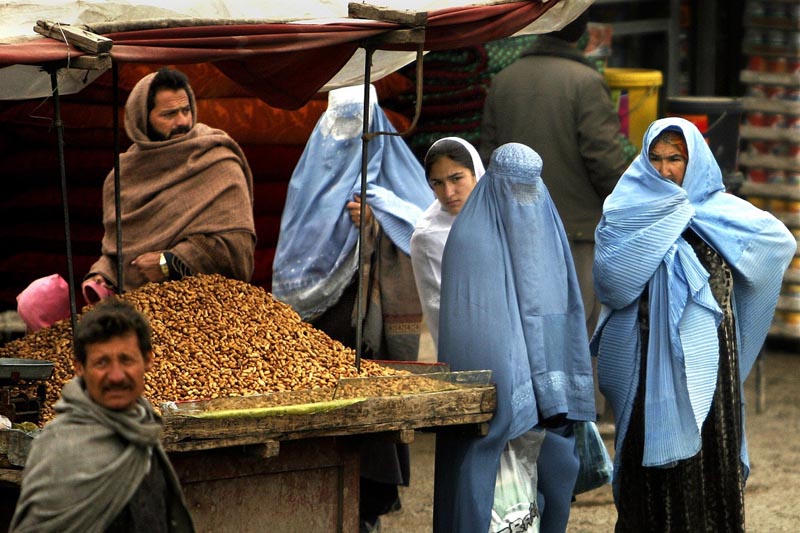 Afghanistan
Afghanistan Human Rights Watch slams Taliban for denying rights to women, girls for past two years
Taliban authorities have tightened their extreme restrictions on the rights of women and girls and on the media since taking took control of Afghanistan on August 15, 2021, Human Rights Watch said on Thursday.
Over the past two years, Taliban authorities have denied women and girls their rights to education, work, movement, and assembly.
The Taliban have imposed extensive censorship on the media and access to information, and increased detentions of journalists and other critics.
Afghanistan has become one of the world’s worst humanitarian crises, with more than 28 million people – two-thirds of the population – in urgent need of humanitarian assistance.
The United Nations has reported that four million people are acutely malnourished, including 3.2 million children under 5.
“People in Afghanistan are living a humanitarian and human rights nightmare under Taliban rule,” said Fereshta Abbasi, Afghanistan researcher at Human Rights Watch. “The Taliban leadership needs to urgently reject their abusive rules and policies, and the international community needs to hold them accountable for the current crises.”
Together with decades of war, extreme weather events, and widespread unemployment, the main causes of food insecurity since the Taliban takeover have been the harsh restrictions on women and girls’ rights.
The result has been the loss of many jobs, particularly the dismissal of many women from their jobs and bans on women working for humanitarian organizations, except in limited areas. Women and girls are denied access to secondary and higher education.
On December 24, 2022, the Taliban announced a ban on women working with all local and international nongovernmental organizations, including the UN, with exemptions for health, nutrition, and education.
This has severely harmed women’s livelihoods, as it is impossible to determine whether women are receiving assistance if they are not involved in the distribution and monitoring processes.
The crisis has disproportionately harmed women and girls, who already have more difficulty getting access to food, health care, and housing.
“The Taliban’s misogynist policies show a complete disregard for women’s basic rights,” Abbasi said. “Their policies and restrictions not only harm Afghan women who are activists and rights defenders but ordinary women seeking to live a normal life.”
Donor countries need to find ways to mitigate the ongoing humanitarian crisis without reinforcing the Taliban’s repressive policies against women, Human Rights Watch said.
The Taliban’s severe restrictions on local media, include blocking international media broadcasting, have hampered access to information in Afghanistan. No one inside the country can report critical information without fear of arbitrary arrest and detention.
Taliban security forces have carried out arbitrary detentions, torture, and summary executions of former security officers and members or supporters of armed resistance groups.
Since the Taliban takeover, the Islamist armed group Islamic State of Khorasan Province, the Afghan affiliate of the Islamic State (ISIS), has carried out many attacks on schools and mosques, mostly targeting ethnic Hazara Shia, who receive little security protection or access to medical care and other assistance.
Thousands of Afghans who had fled the country remain in limbo in third countries, including Pakistan, the United Arab Emirates, Iran, and Turkey, in many cases in dire conditions. Governments engaged with Afghanistan have a responsibility to ensure that Afghans at risk of persecution or harm have meaningful access to legal and safety pathways. Governments should fulfill their commitments and resettle these at-risk groups as soon as possible, Human Rights Watch said.
“The Taliban’s response to Afghanistan’s overwhelming humanitarian crisis has been to further crush women’s rights and any dissent,” Abbasi said.
"Governments engaging with the Taliban should press them to urgently reverse course and restore all Afghans’ fundamental rights while providing vital assistance to the Afghan population.”
Support Our Journalism
We cannot do without you.. your contribution supports unbiased journalism
IBNS is not driven by any ism- not wokeism, not racism, not skewed secularism, not hyper right-wing or left liberal ideals, nor by any hardline religious beliefs or hyper nationalism. We want to serve you good old objective news, as they are. We do not judge or preach. We let people decide for themselves. We only try to present factual and well-sourced news.







